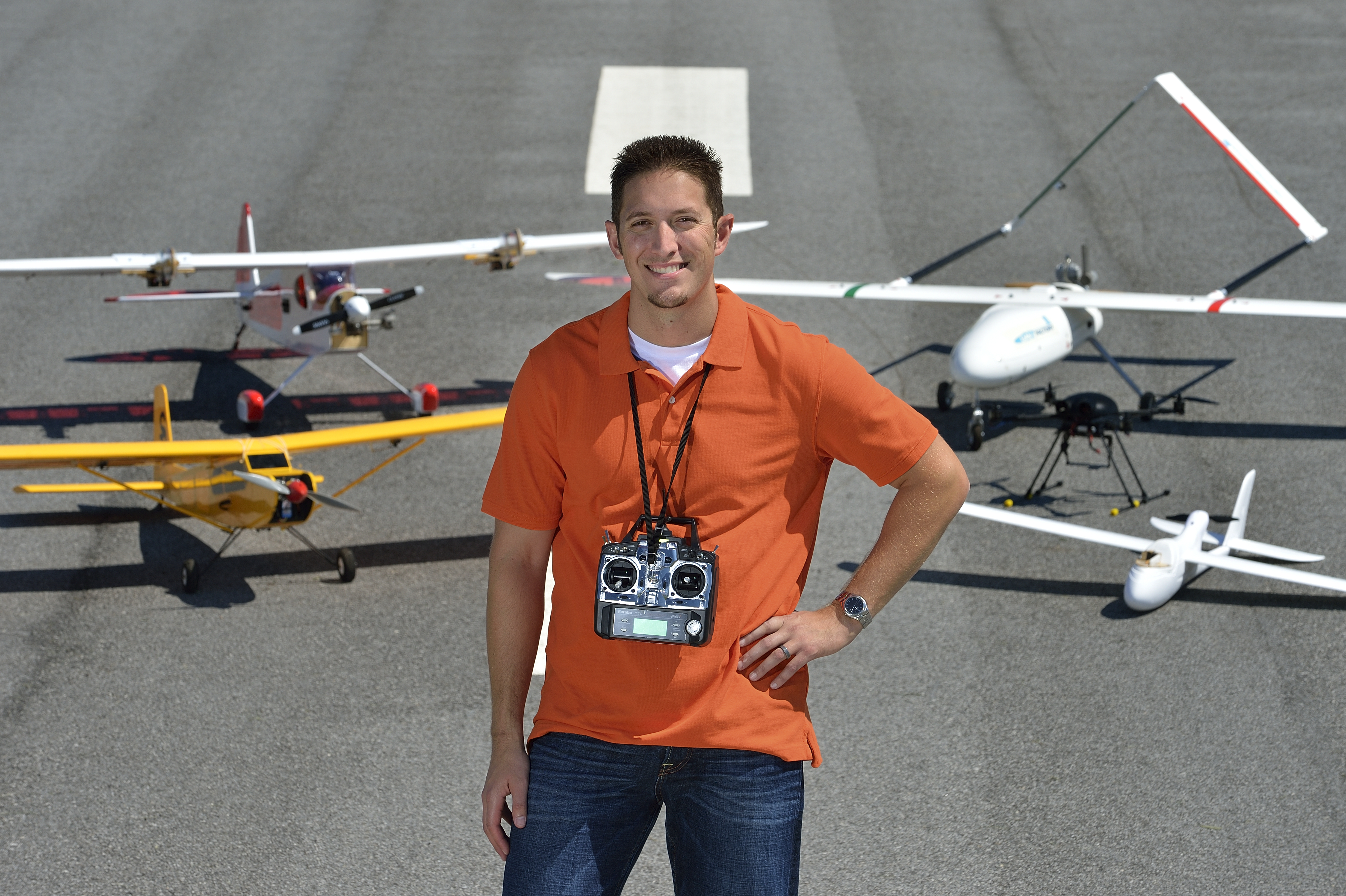Popular Science names David Schmale one of 2013's Brilliant Ten

David G. Schmale III, an associate professor of plant pathology, physiology, and weed science in the College of Agriculture and Life Sciences, was named one of Popular Science’s 2013 Brilliant Ten in the magazine’s October issue on stands now.
His research using drones — also called unmanned aerial vehicles or UAVs — to explore microbial life in the atmosphere earned him a spot on the prestigious list of international scientists, engineers, and thinkers whose innovations change the world.
Schmale and colleagues use research drones to track the movement of dangerous microorganisms that surf atmospheric waves. These atmospheric waves collect, mix, and shuffle microorganisms across cities, states, and even countries. This research has deepened our understanding of the flow of life in the atmosphere, and has contributed unique tools for scientific exploration in the burgeoning field of aeroecology.
“Important pathogens of plants, domestic animals, and humans can be transported over long distances in the atmosphere. Drones are important tools to study how these pathogens travel from one location to another," said Schmale. "They can be used to help predict potential outbreaks of human and animal diseases, and even help farmers time their application of pesticides to thwart crop destruction."
Others young researchers on the Brilliant Ten list this year include a Massachusetts Institute of Technology engineer who is innovating new for tools for structural design, a University of Pennsylvania researcher examining gene expression, and a California Institute of Technology scientist exploring weather patterns of far-away planets.
“This collection of 10 brilliant young researchers is our chance to honor the most promising work — and the most hardworking people — in science and technology today,” said Jake Ward, editor-in-chief of Popular Science. “This year's winners are particularly distinguished and I'm proud to welcome them all as members of the 2013 Brilliant Ten."
Schmale, his team, and collaborators have had a number of high-impact findings since he began exploring high-flying microorganisms with drones.
“David is a tremendous innovator who is advancing our knowledge of food safety and biosecurity by using new research tools that examine previously uncharted regions,” said Elizabeth Grabau, head of the Department of Plant Pathology, Physiology, and Weed Science.
He was the first to develop an autonomous drone to sample microorganisms in the lower atmosphere. This new technology was published in the Journal of Field Robotics in 2008.
Schmale and his collaborator Shane Ross, an associate professor of engineering science and mechanics at Virginia Tech, have discovered that important pathogens of plants, animals, and humans are transported tens to hundreds of kilometers via invisible atmospheric waves known as atmospheric transport barriers. This work was published in the journal Chaos in 2011.
His drones collected strains of a fungus that caused a devastating disease of wheat and produced dangerous toxins that far exceeded U.S. food safety threshold levels. This work was published in the journal Aerobiologia in 2012.
These discoveries have unleashed new and exciting civilian applications for drones, such as scouting for pests above crops and validating models for the spread of pathogens.
Schmale is currently working on a project funded by the National Science Foundation with Boris Vinatzer, an associate professor of plant pathology, physiology, and weed science, and other scientists around the world to study microorganisms in rain. Since some of these microorganisms have the potential to modulate weather, this work could lead to more accurate weather forecasting in the future.
Schmale is also passionate about getting young students interested in science. He has worked with Roanoke, Va., high school teacher Cynthia Bohland and her students to build gliders to better understand how living things fly and constructed LEGO mazes for a slime mold so students can comprehend the movement of microorganisms.
Research in the Schmale laboratory is currently supported by funds from the National Science Foundation (Dimensions of Biodiversity, the Integrative Graduate Education and Research Traineeship, and Dynamical Systems programs), the U.S. Department of Agriculture, and the Virginia Small Grains Board.
He will be one of the speakers at the Nov. 9 TEDxVirginia Tech event that features people who think beyond borders. The title of his talk is, “Drone-ing for life in the atmosphere.”
Other researchers from Virginia Tech have been on the magazine's Brilliant Ten list in years past, including Dennis Hong, an associate professor with the College of Engineering and two-time Virginia Tech College of Engineering alumnus Maurizio Porfiri.
While he is in Blacksburg, much of Schmale’s flying happens at Virginia Tech's Kentland Experimental Systems Laboratory, where he and other Virginia Tech researchers use the lab and associated airstrip to conduct sponsored research using a variety of unmanned systems.
“I’m thankful to be doing the science that I love, to be working with the best scientists and engineers in the world, and for this honor by Popular Science,” Schmale said. “It's an exciting time to be an atmospheric explorer. The sky is the limit.”




